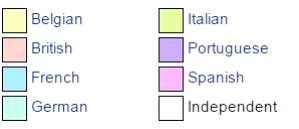History of Africa
Africa is often called the cradle of civilization. The first human beings roamed the continent about 2 million years ago. Old civilizations grew along the banks of the Nile River. Thousands of years ago ancient Egypt became a powerful empire, to the south Nubia emerged in today’s Sudan.
In the early centuries after the birth of Christ Christianity started to spread to northern Africa. In the Middle Ages Islam became the major religion. It spread across northern Africa very quickly and later on expanded to regions south of the Sahara desert. Christianity experienced a comeback in the 19th century when missionaries from Europe began to spread it to western and central Africa.
After 1000 A.D., great empires emerged in Ghana and other areas in western African. City-states, including Mogadishu and Zanzibar, grew into powerful trading centres in East Africa.
Towards the end of the Middle Ages the first Europeans came to Africa. From the early 1500s on, they made money by bringing slaves to North America. The British, Dutch and Portuguese set up trading posts along the western African coast where they searched for gold and ivory. In the 17th century, the Dutch set up a trading post at the Cape of Good Hope. It grew into a Dutch colony until the 19th century, when the British took over.
At the end of the 19th century, Europeans ruled most of Africa. They saw the continent as a major source of raw materials that they could bring back to Europe for their emerging industries. As a result, the Industrial Revolution did not take place in Africa. Throughout the colonial period, European countries fought for influence and control in Africa. In the “Scramble for Africa”, they divided the continent into spheres of interest. Native Africans often resisted colonial governments and in many areas, they were killed in uprisings.
The main colonial powers were:
- Great Britain (Egypt, Sudan, Eastern Africa, Rhodesia and South Africa)
- France (Algeria, French West Africa, Equatorial Africa)
- Belgium (Congo)
- Portugal(Angola, Mozambique)
- Germany (Southwest Africa - Namibia)
- Spain (Spanish Sahara)
- Italy (Ethiopia, Libya, Somaliland)
In the early 1900s, nationalism grew in many areas of Africa. People wanted colonialism to end and be free. After World War II most European countries ended their involvement in Africa, either out of their own free will or because they were forced out.


African colonies
Image: Eric Gaba – Wikimedia Commons user: Sting, CC BY-SA 3.0,
via Wikimedia Commons
In the 1950s, Algerians started to revolt against France. In a bloody colonial war that cost a million lives the Algerians became independent in 1962. In Angola and Mozambique, the Portuguese fought wars before they gave up their territories.
One of the last countries to gain independence was Rhodesia, today’s Zimbabwe, where blacks fought for over a decade against the British. In South Africa, white Europeans gave up control of the country after Apartheid ended in the 1990s.
Many African countries did not know how to cope with their newly gained independence, largely because they had no experience in administrating and governing a nation. As a result, civil wars, tribal conflicts and power struggles broke out. They resulted in dozens of wars in Africa since the 1960s. In the most gruesome conflict of the 1990s, a civil war in Ruanda led to the massacre of hundreds of thousands of people. However, Africa has had to cope with other problems as well. Virus outbreaks, for example Ebola, and other tropical diseases have killed thousands in the past years.